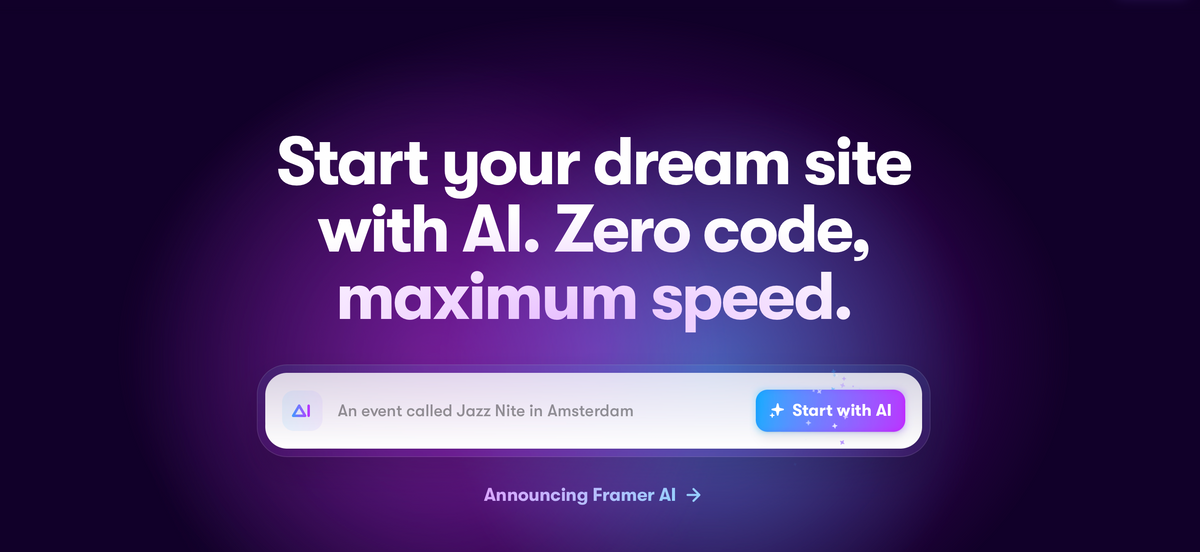The advent of artificial intelligence (AI) has enabled unprecedented advancements in website design, with tools such as Framer's new AI site generator facilitating the creation of professional, responsive websites without coding or graphic design skills. The generator uses prompts provided by the user to craft unique designs, providing a simple, yet powerful tool for both beginners and advanced users.
The Era of AI in Website Design
With the increasing adoption of artificial intelligence (AI) in various fields, website design has also undergone significant transformation. The release of Framer's AI site generator has revolutionized the process of website creation, simplifying it to the extent where coding or graphic design skills are not requisite. This tool relies on user-defined prompts to create professional and responsive websites, opening up new avenues for both beginners and advanced designers.
Understanding the Framer AI Site Generator
Framer's AI site generator is a breakthrough feature that allows the creation of websites by writing out prompts. This approach is distinct from text generation with AI, drawing closer parallels to image generation. It necessitates an effective prompt to initiate the design process and continues to generate variants until a visually appealing design emerges. A new project opened in Framer displays a "Start with AI" button, inviting users to engage with the innovative feature.
Andy, the host of Framer University, comments, "Generating websites with AI is a bit different from generating text with AI because AI doesn't have taste." This alludes to the iterative process involved in creating an attractive design using AI, much like image generation.
Using the AI Site Generator: The Step-by-Step Process
A well-crafted prompt is the first step to using the AI site generator effectively. Andy suggests starting the prompt by clarifying that the user is a professional web designer, setting the expectations for a professional website design. The user then details the type of website needed, the target audience, and some context about the website.
Once the prompt is entered and the user is satisfied, a click on the "start" button initiates the website generation process. The AI begins to shape the website right before the user's eyes, creating an engaging design. If the initial design doesn't meet the user's taste, they can regenerate the website until an appealing design appears.
Customizing the AI-Generated Design
Although AI simplifies the design process, user intervention is still required to fine-tune the results. The AI-generated websites are generally responsive and adjust well to different screen widths, but adjustments might be necessary in certain areas. From text edits to design changes like rounded corners and font sizes, Framer allows comprehensive customization to meet user preferences. Users can add additional sections and content, offering immense flexibility to the AI-generated starting point.
Publishing the AI-Generated Website
Once the user is satisfied with the design, publishing the website is a straightforward process. A free subdomain on framer.ai can be used to make the website live on the internet. The final step in the customization process involves linking the website's buttons to the desired destinations, adding a functional dimension to the design.
The Future of AI in Website Design
The Framer AI site generator is a shining example of the potential AI holds for website design. It simplifies the design process, reduces the need for coding skills, and opens up website design to a wider audience. The tool is a starting point for advanced users and a helping hand for beginners, facilitating learning and exploration in the world of design. As Andy states, "If you generate something cool, just leave it in the comments because I would like to see what you guys can create with this new AI power tool."
A New Contender in the AI Web Design Landscape
Lately, we've seen a myriad of "text-to-website" solutions being introduced, each attempting to simplify the process and create intuitive, appealing sites. Despite numerous attempts, Framer's AI site generator stands out as one of the most polished and well-executed tools currently available.
There are several reasons contributing to Framer's exceptional position in the automated web design market. Firstly, its utilization of user-provided prompts to inform the AI's design process is a novel approach, allowing the system to generate a unique website that is highly tailored to the user's specific needs. This is in contrast to many other automated design tools, which often rely on generic templates.
Secondly, Framer's high level of customizability sets it apart. Users can adjust almost every aspect of the AI-generated design, from text and font to the layout of individual sections. This allows for a degree of personalization and refinement that many competing AI design tools do not offer.
Thirdly, the simplicity of Framer's user interface contributes to its appeal. Despite the complex technology underpinning its operations, Framer maintains a user-friendly interface, making it easy for users at all levels of expertise to create professional websites.
Lastly, Framer’s innovative approach to responsive design is worth noting. The AI site generator creates websites that adapt well to various screen widths, a feature critical in today’s mobile-dominated browsing landscape.
The combination of these features has resulted in Framer emerging as a formidable competitor to established platforms such as Webflow and WordPress. It rivals these platforms in terms of ease of use and customizability and presents a compelling advantage with its unique AI-powered design approach. This positions Framer as a game-changer in the web design industry, demonstrating the immense potential AI holds for this field.
Conclusion
AI's role in website design is becoming increasingly prominent, with tools like Framer's AI site generator leading the way. By transforming prompts into professional and responsive websites, Framer broadens the realm of website design to include those without coding or design skills. With continued advancements, AI is set to further democratize website design, paving the way for a future where high-quality website creation is accessible to all.







